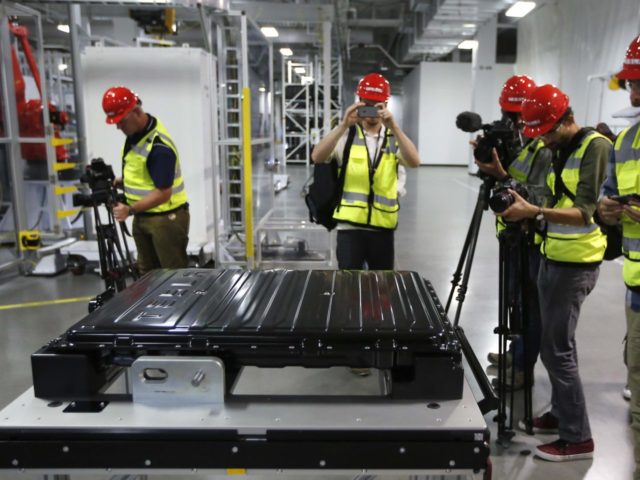From a Swedish study, difficult to claim bias.
Delingpole: Tesla Car Batteries Not Remotely Green, Study Finds

Rich Pedroncelli / Associated Press
by JAMES DELINGPOLE21 Jun 2017206
The car batteries used in a Tesla generate as much CO2 as driving a gasoline-powered car for eight years. And that’s before they even come off the production line.
This news, from a study by the Swedish Environmental Research Institute, will no doubt delight all those U.S. taxpayers who have been forking out billions of dollars to prop up Tesla’s share price having been assured by their government that subsidizing overpriced electric cars represents a vital step towards “combatting climate change.”
The report, commissioned by the Swedish Transport Administration and the Swedish Energy Agency, cannot easily be dismissed because it is a meta-analysis (ie a summary) of all the available studies on the subject.
The report shows that the battery manufacturing leads to high emissions. For every kilowatt hour of storage capacity in the battery generated emissions of 150 to 200 kilos of carbon dioxide already in the factory. The researchers did not study individual bilmärkens batteries, how these produced or the electricity mix they use. But if we understand the great importance of play battery take an example: Two common electric cars on the market, the Nissan Leaf and the Tesla Model S, the batteries about 30 kWh and 100 kWh.
Even when buying the car has thus emissions occurred, corresponding to approximately 5.3 tons and 17.5 tons, the batteries of these sizes. The numbers can be difficult to relate to. As a comparison, a trip for one person round trip from Stockholm to New York by air causes the release of more than 600 kilograms of carbon dioxide, according to the UN organization ICAO calculation.
Another conclusion of the study is that about half the emissions arising from the production of raw materials and half the production of the battery factory. The mining accounts for only a small proportion of between 10-20 percent.
One of the authors, Mats-Ola Larsson at IVL, has made a calculation of how long you have to drive a petrol or diesel before it has released as much carbon dioxide as battery manufacturing has caused.
The result was 2.7 years for a battery of the same size as the Nissan Leaf and 8.2 years for a battery of the Tesla-size.
Truly the enduring mystery of why Tesla is now more highly valued than such non-Potemkin U.S. car manufacturers as Ford and General Motors grows more mysterious by the hour.
Delingpole: Tesla Car Batteries Not Remotely Green, Study Finds

Rich Pedroncelli / Associated Press
by JAMES DELINGPOLE21 Jun 2017206
The car batteries used in a Tesla generate as much CO2 as driving a gasoline-powered car for eight years. And that’s before they even come off the production line.
This news, from a study by the Swedish Environmental Research Institute, will no doubt delight all those U.S. taxpayers who have been forking out billions of dollars to prop up Tesla’s share price having been assured by their government that subsidizing overpriced electric cars represents a vital step towards “combatting climate change.”
The report, commissioned by the Swedish Transport Administration and the Swedish Energy Agency, cannot easily be dismissed because it is a meta-analysis (ie a summary) of all the available studies on the subject.
The report shows that the battery manufacturing leads to high emissions. For every kilowatt hour of storage capacity in the battery generated emissions of 150 to 200 kilos of carbon dioxide already in the factory. The researchers did not study individual bilmärkens batteries, how these produced or the electricity mix they use. But if we understand the great importance of play battery take an example: Two common electric cars on the market, the Nissan Leaf and the Tesla Model S, the batteries about 30 kWh and 100 kWh.
Even when buying the car has thus emissions occurred, corresponding to approximately 5.3 tons and 17.5 tons, the batteries of these sizes. The numbers can be difficult to relate to. As a comparison, a trip for one person round trip from Stockholm to New York by air causes the release of more than 600 kilograms of carbon dioxide, according to the UN organization ICAO calculation.
Another conclusion of the study is that about half the emissions arising from the production of raw materials and half the production of the battery factory. The mining accounts for only a small proportion of between 10-20 percent.
One of the authors, Mats-Ola Larsson at IVL, has made a calculation of how long you have to drive a petrol or diesel before it has released as much carbon dioxide as battery manufacturing has caused.
The result was 2.7 years for a battery of the same size as the Nissan Leaf and 8.2 years for a battery of the Tesla-size.
Truly the enduring mystery of why Tesla is now more highly valued than such non-Potemkin U.S. car manufacturers as Ford and General Motors grows more mysterious by the hour.

